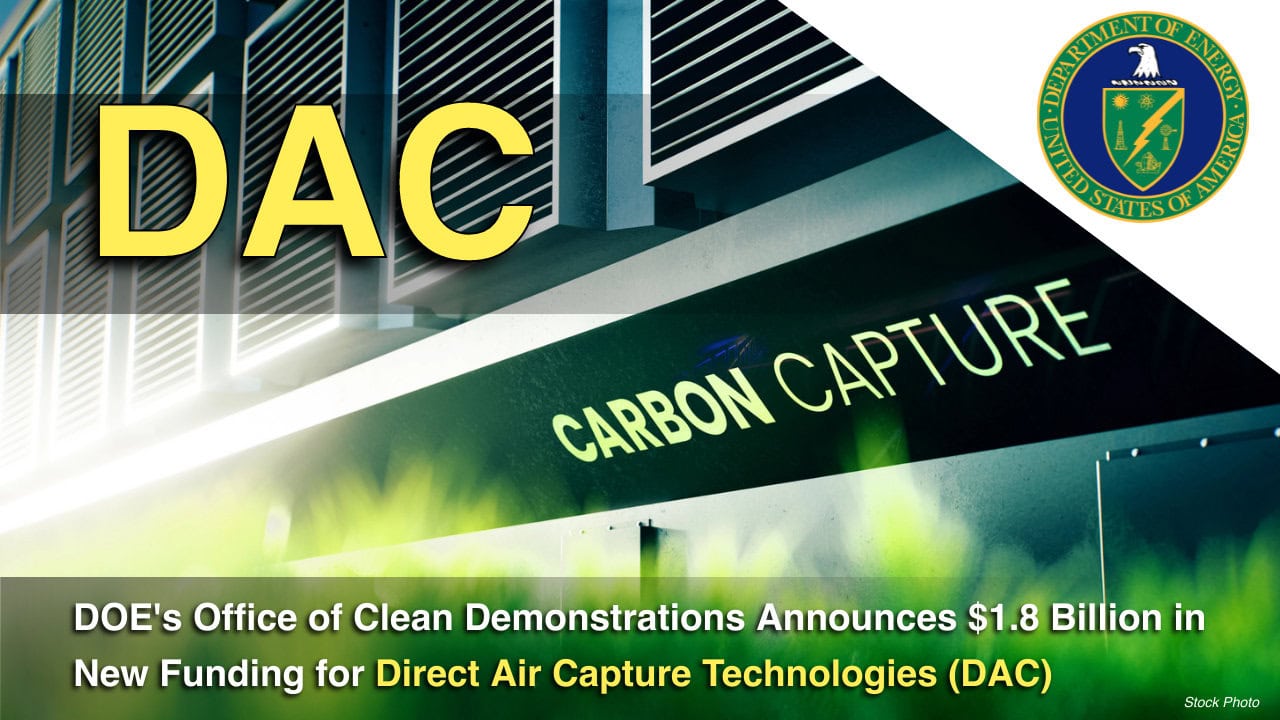The U.S. Department of Energy (DOE) Office of Clean Energy Demonstrations (OCED) today opened applications for up to $1.8 billion in funding for the design, construction, and operation of mid- and large-scale commercial direct air capture (DAC) facilities and infrastructure access platforms.
The U.S. Department of Energy (DOE) Office of Clean Energy Demonstrations (OCED) today opened applications for up to $1.8 billion in funding for the design, construction, and operation of mid- and large-scale commercial direct air capture (DAC) facilities and infrastructure access platforms. As part of the Regional DAC Hubs program, this funding will help support an ecosystem of projects designed to provide DAC technology and project developers with support at various stages on their commercialization path and ultimately spur the growth of additional DAC Hubs. The widespread deployment of innovative DAC technologies that capture legacy emissions from the atmosphere are key to reinforcing our nation’s global competitiveness and delivering new economic opportunities for American communities and industries.
The funding announced today provides flexible and comprehensive pathways to spur the development of commercial DAC facilities, including those at mid- to large-scale along with supporting infrastructure, with the goal of expanding to Regional DAC Hubs. OCED is building off of the success of the first solicitation in August 2023, under the Regional DAC Hubs program that selected 21 projects for award negotiations, including two Regional DAC Hubs in Louisiana and Texas. The additional 19 projects, managed by DOE’s Office of Fossil Energy and Carbon Management, received funding for earlier stages of project development, including feasibility assessments and front-end engineering and design (FEED) studies to assess viability of future DAC Hub demonstrations.
This funding also supports the development of Regional DAC Hubs by providing the DAC industry with more comprehensive support as it continues to commercialize new technologies. Funding for mid-scale DAC facilities and complementary infrastructure platforms is a critical step to help earlier stage developers prove out their technology and business model before advancing to larger-scale demonstrations. While the majority of the funding is planned for larger-scale facilities, the funding for mid-scale facilities and supporting platforms is envisioned to fill a critical gap on the pathway to large-scale commercialization. For this opportunity, OCED plans to offer funding across the following three topic areas:
- Topic Area 1 – Infrastructure Access Platforms: Funding 1-3 infrastructure access platforms, or host sites, to provide DAC developers with a place to build and operate facilities with access to clean energy and shared carbon dioxide (CO2) post-capture storage or utilization offtakers. Maximum of $250 million for a single project.
- Topic Area 2 – Mid-Scale Commercial DAC Facilities: Funding 4-8 mid-scale commercial DAC facilities with a capture capacity between 2,000 and 25,000 tons of carbon dioxide (CO2) per year. Maximum of $50 million for a single project.
- Topic Area 3 – Large-Scale Commercial DAC Facilities: Funding 2-6 large-scale commercial DAC facilities with a minimum capture capacity of 25,000 tons of CO2 per year. Maximum of $600 million for a single project.
To best support the rapidly advancing DAC industry and ensure the latest generations of DAC technology and the highest-impact projects are included, OCED intends to offer recurring openings in funding across multiple years.
Read the Notice of Funding Opportunity here. Concept Papers are required for Topic Area 2 & 3 and Pre-Applications are required for Topic Area 1. Deadlines for both Concept Papers and Pre-Applications are due by January 31, 2025, and full applications due by July 31, 2025. OCED is also planning to host an informational webinar on Monday, January 13 at 2 p.m., ET to discuss the funding opportunity. Register for the informational webinar here. Please visit the OCED website to learn more about engagement opportunities related to the Regional DAC Hubs program.
Source: DOE





